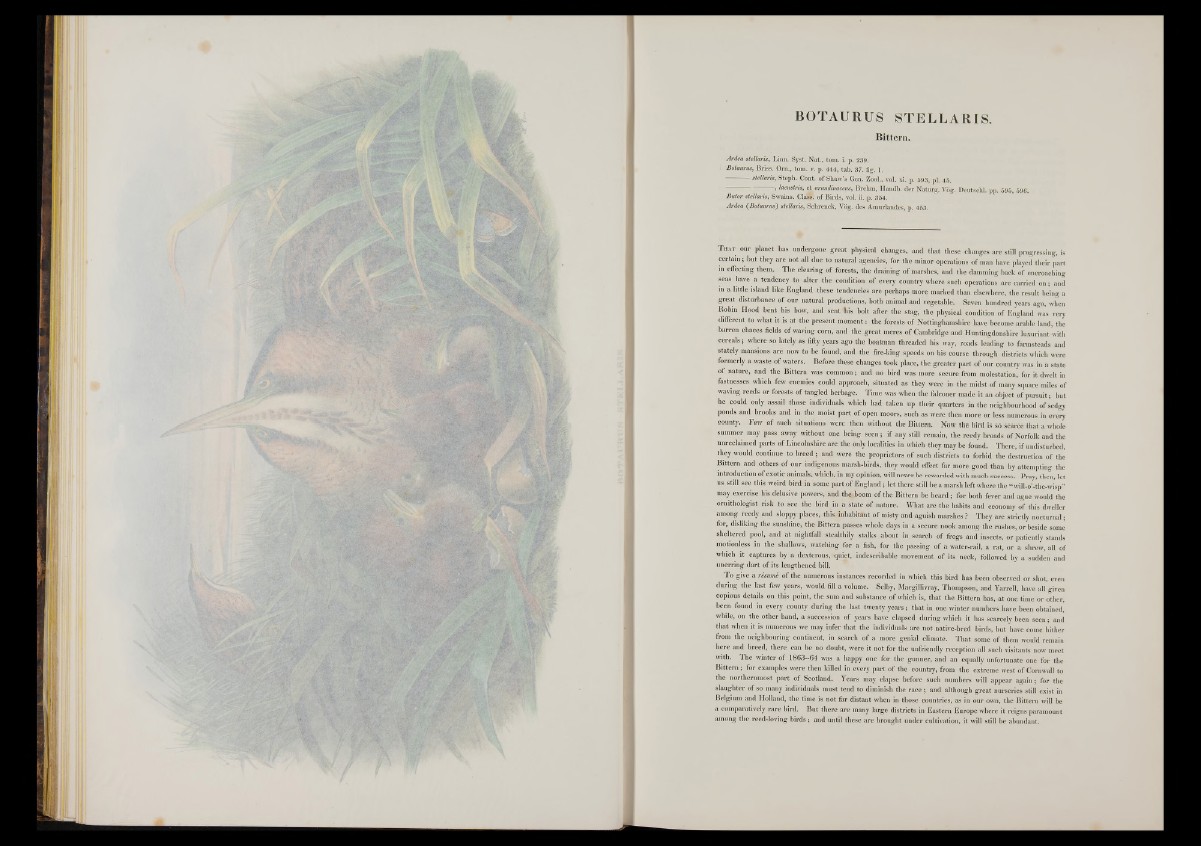
Bittern.
Ardea stellaris, Linn. Syst. Nat., tom. i. p. 239.
Botaurus, Briss. Ora.,, tom. v. p. 444, tab. 37. fig. I.
— stellaris, Steph. Cont. of Shaw’s Gen. Zool., vol. xi. p. 593, pi. 45.
, lacustris, et arundinaceus, Brehm, Handb. der Naturg. Vog. Deutschl. pp. 595, 596.
Butor stellaris, Swains. Cías!, of Birds, vol. ii. p. 354.
Ardea ( Botaurus) stellaris, Scbrenck, Vóg. des Amurlandes, p. 453.
Tìhat our planet has undergone great physical changes, and that these changes are still progressing, is
certain; but they are not all due to natural agencies, for the minor operations of man hare played their part
in effecting them. The clearing o f forests, the draining of marshes, and the damming back of encroaching
seas have a tendency to alter the condition o f every country where such operations are carried on ; and
in a little island like England these tendencies are perhaps more marked than elsewhere, the result being a
great disturbance of onr natural productions, both animal and vegetable. Seven hundred years ago, when
Robin Hood bent his bow, and sent ills bolt after th e stag, the physical condition of England was very
different to what it is at the present moment ; the forests of Nottinghamshire have become arable land, the
barren chaces fields of waving corn, and the great meres o f Cambridge and Huntingdonshire luxuriant with
cereals ; where so lately as fifty years ago thé boatman threaded his way, roads leading to farmsteads and
stately mansions are now to be found, and the fire-king speeds on his course through districts which were
formerly a,waste of waters. Before these changes took place, the greater part o f our country was in a state
o f nature, and the Bittern was common ;/ and no bird was more secure from molestation, for it dwelt in
fastnesses which few enemies could approach, situated as they were in the midst o f many square miles of
waving reeds o r forests o f tangled herbage. Time was when the falconer made it an object o f pursuit ; but
he could only assail those individuals which had taken up their quarters in the neighbourhood o f sedgy
ponds and brooks and in the moist p art o f open moors, such as were then more or less numerous in every
county. Few o f such situations were then without the Bittern. Now the bird is so scarce that a whole
summer may pass away without one being seen; if any still remain, the reedy broads of Norfolk and the
unreclaimed parts of Lincolnshire arefthe only localities in which they may be found; There, if undisturbed,
they would continue to breed'; and were the proprietors of such districts to forbid the destruction of thé
Bittern and others o f onr indigenous marsh-birds, they would effect far more good than by attempting the
introduction o f exotic animals; which, in ray opinion, will never be rewarded with much success. Pray, then, let
ns still see this weird bird in some p art o f England ; let there still he a marsh left where the “ will-o’-the-wisp'’
may exercise, his delusive powers, and thqfboom of the Bittern be h eard ; for both fever and ague would the
ornithologist : risk . to see the . bird in a state o f nature. What: are the habits and economy o f this dweller
among reedy and sloppy places, this.jnhabitdnt.of misty:and aguish marshes? They are strictly nocturnal;
for, disliking the sunshine, the Bittern passes whole days in a secure nook among the rushes, or beside somé
sheltered pool, and a t nightfall stealthily stalks about in search o f frogs and insects, o r patiently stands
motionless in the shallows, watching for a fish, for the passing of a water-tail,-a rat, o r a shrew, all of
which it captures by a dexterous, *qhmt, indescribable movement of its neck, followed by a sudden and
unerring d art of its lengthened bill.
To give a résumé of the numerous instances recorded in which this bird has been observed o r shot, even
during the last few years, would fill a volume. Selby, Maegillivray, Thompson, and Yarrell, have all given
copious details on this point, the sum and substance of which is, th at the Bittern has, a t one time or other,
been found in every county during the last twenty years ; that in one winter numbers have been obtained,
while, on the other hand, a succession of years have elapsed during which it has scarcely been seen; and
that when it is numerous we may infer that the individuals are not native-bred birds, but have come hither
from the neighbouring continent, in search o f a more genial climate. That some of them would remain
here and breed, there can be no donbt, were it not for the unfriendly reception all such visitants now meet
with. The winter o f 1 8 63-64 was a happy one for the gunner, and an equally unfortunate one for the
B itte rn ; for examples were then killed in every p art of the country, from the extreme west o f Cornwall to
the northernmost p art o f Scotland. Years may elapse before such numbers will appear again ; for the
slaughter of so many individuals must tend to diminish the race ; and although great nurseries still exist in
Belgium and Holland, the time is not for distant when in those countries, as in our own, the Bittern will be
a comparatively rare bird. But there are many large districts in Eastern Europe where it reigns paramount
among the reed-loving birds ; and until these are brought under cultivation, it will still be abundant.